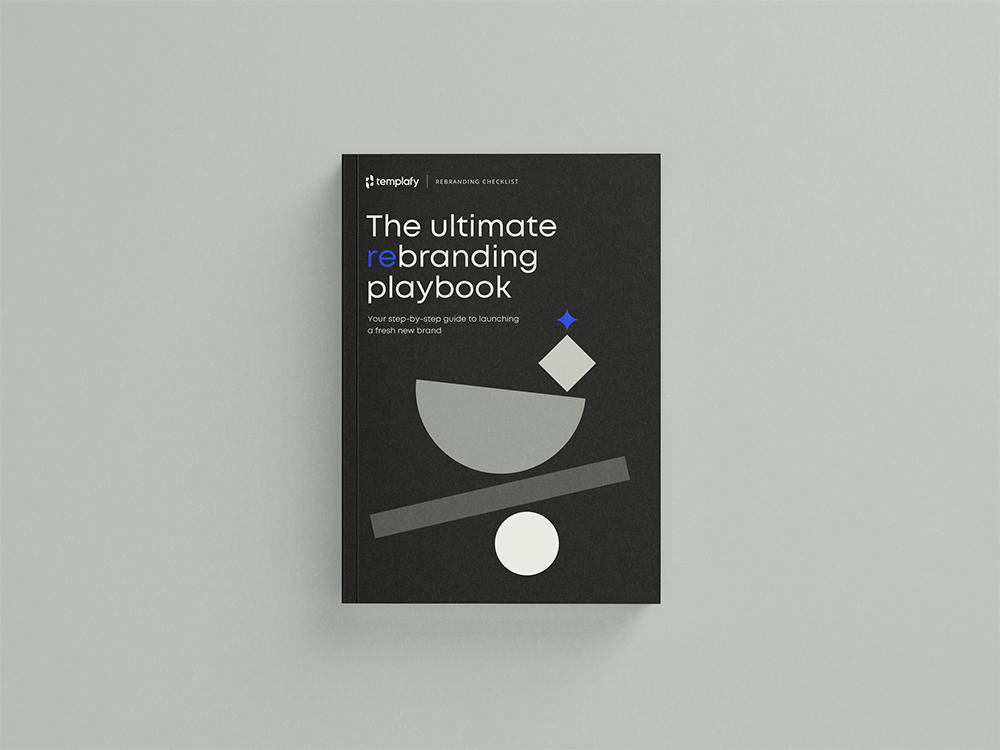Brand integrity: How to win customer trust and loyalty

Trust issues: Why the small things matter
A potential client opens your sales pitch. The messaging is on point, but the presentation isn’t. The logo is stretched, the colors are off, and the fonts are all over the place. It might seem like a minor detail to the sales rep who pulled it together, but to your audience, it’s a big red flag. The little things paint a bigger picture: if your brand can’t keep its own materials consistent, how can it deliver on its promises?
Brand integrity might seem like just another brand buzzword, but it’s actually the foundation of trust—and trust directly impacts your bottom line.
In fact, 77% of consumers prefer to buy from brands they trust. It’s not just about what you say—it’s about what you show, what you do, and how you deliver, every single time.
In this blog, we’ll break down what it takes to build brand integrity that lasts (and how to measure if it’s working). From smart strategies to tools that guarantee consistency, you’ll walk away with everything you need to earn customer trust, build loyalty that lasts, and stand out in a crowded market.
What is brand integrity and why is it so important?
Brand integrity is a lot like personal integrity. We trust people who keep their promises, and we trust brands that do the same. A brand that promises quality, sustainability, innovation, or fairness—and delivers it—earns loyalty that lasts.
At its core, brand integrity boils down to one simple question: Do your actions align with your values?
Why trust is the ultimate currency
“Brand integrity” might sound fluffy, but it’s far from it. While it’s not as easy to measure as brand ROI, it’s just as critical to success. A recent survey of 395,000 consumers by Havas, found “cynicism is at an all-time high” (Havas). Less than half (47%) of brands are seen as trustworthy and 75% could disappear and would be easily replaced. Trust is everything, and without it, your brand doesn’t stand a chance at long-term success.
Here’s the proof:
- 82% of investors say brand strength and trust influence their investment decisions. (London School of International Business, U.K.)
- 88% of consumers say authenticity is key when deciding what brands they like and support. (Stackla)
- 62% of global consumers want companies to take a stand on social, cultural, or environmental issues—and they’ll switch brands if they feel yours doesn’t align with their values. (Edelman)
Building trust means making sure your business lives up to its promises, in all the places your customers find it.
How to measure brand integrity
You can’t fix what you don’t measure. Here are some ways to see if your brand is walking the talk:
- Customer satisfaction scores (CSAT): How happy are your customers?
- Net Promoter Score (NPS): Are they willing to recommend you?
- Social media sentiment analysis: What’s the vibe in online conversations about your brand?
- Customer retention metrics: Are people sticking around?
- Employee advocacy: Are your employees proud to represent your brand?
- Customer reviews and ratings: What’s the word on the street about your products or services?
- Crisis response effectiveness: How does your brand handle tough situations?
Measuring these data points gives insight into whether customers feel your actions reflect your values.
brand integrity
4 pillars to building brand integrity that lasts
- Be agile
- Stay consistent
- Have a purpose
- Live up to your promises
Can’t-miss branding tips
Learn how to keep your brand consistent. Get ideas and examples to help your team create on-brand work with less effort.
Brand integrity is the result of deliberate, consistent actions that align with your values and keep your promises. Here’s how to build it:
1. Be agile
Customer expectations shift quickly.
Agility, in a business context, is about being flexible, responsive, and proactive in adapting to changes. It’s about having the ability to pivot quickly as the market changes.
The brands that win are those anticipating what comes next. This could look like an ethical clothing brand that proactively publishes reports on its supply chain, instead of waiting for customers to demand it.
Why it matters:
- 64% of consumers wish companies would respond faster with new offerings to meet their changing needs. (Accenture)
- Research emphasizes that adopting agile practices enables organizations to deliver continuous value to customers, which is crucial for enhancing customer satisfaction. (Forrester)
Building agility into your brand starts with knowing your audience. Actively listen to their feedback through reviews, surveys, and social media. Use those insights to inform your next steps, whether it’s tweaking your offerings or pivoting your strategy. Agility builds trust by proving you’re paying attention and willing to evolve.
2. Stay consistent
When your messaging, visuals, and customer experience are aligned, it reinforces trust and creates a sense of familiarity that keeps customers coming back.
Why it matters:
- Consistency increases brand recognition by 80% (GGGlobal).
- Brands with consistent messaging see a 33% boost in revenue (Marq).
Start by creating clear brand guidelines that cover everything from tone of voice to color palettes and templates. But don’t stop there: make sure those guidelines are actually followed across every channel and by every team. Every interaction should feel like it’s coming from the same trusted source.
3. Have a purpose
Consumers today expect brands to stand for something bigger than profit. Having a clear purpose not only inspires loyalty but also creates a deeper connection with your audience. Whether your focus is sustainability, innovation, or social justice, a meaningful mission can set your brand apart.
The stats back it up:
- 82% of consumers prefer brands whose values align with their own (Google Cloud).
- Purpose-driven brands grow 3x faster than their competitors (Deloitte).
Your purpose should influence everything you do. From the products you create to the partnerships you form, your mission should guide your decisions and actions. And don’t be afraid to communicate it: when your audience sees your purpose in action, it builds authenticity and trust.
Take Patagonia, for example:
Patagonia isn’t just selling outdoor gear. Their core values (quality, integrity, environmentalism, justice, and staying unconventional) are written into everything they do. And their actions live up to them; here are three cool things Patagonia has done to maintain brand integrity:
- Sued the U.S. government to protect public lands
- Committed 1% of sales to environmental causes (that was an estimated $15 million in 2022)
- Transferred ownership of the company to a trust and a nonprofit dedicated to combating climate change
But purpose-driven actions don’t always have to make headlines. Even smaller initiatives can make a big impact, like donating to an aligned charity, or choosing partners with the same values.
4. Live up to your promises
Nothing destroys trust faster than a broken promise. Whether it’s about product quality, sustainability goals, or customer support, brands that consistently deliver on their commitments earn long-term loyalty. But it’s not just about meeting expectations—it’s about being transparent when you fall short.
Why it matters:
- A study by KPMG found that 54% of UK consumers would stop buying from a company if it was found to have been misleading in its sustainability claims. (KPMG)
- Research by Marketing Week indicates that 58% of adults don’t trust a brand until they have seen real-world proof that it has kept its promises. (Marketing Week).
Start by clearly defining your brand promises, whether it’s a commitment to ethical sourcing or a guarantee of fast, responsive support. Then, regularly evaluate whether you’re delivering on those commitments. And when things don’t go as planned, own it. Transparency, even in failure, builds credibility and trust. Customers are far more likely to stick with a brand that takes responsibility and learns from its mistakes.
Additional content
Considering a rebrand for your organization?
Are you prepared to elevate your brand to new heights? Don’t miss a step in your new brand launch.


Why consistency builds brand integrity
When your brand looks, feels, and acts the same across every interaction, it signals to customers that you’re dependable. It’s like meeting a friend who’s always true to their word; you know what to expect, and that builds trust.
Consistency spans everything from your visual identity (logos, fonts, colors) to your tone of voice, messaging, and even customer service. It creates a sense of familiarity and reassurance that keeps customers coming back.
Why it matters:
- 86% of consumers favored brands with consistent user experience (Domain Wheel)
- 68% of companies report that brand consistency has contributed 10% to more than 20% of their revenue growth. (GaggleAmp)
Think of your brand as a promise. Every touchpoint (whether it’s a social media ad, an email, or a product label) should reinforce that promise. If one piece feels off, it can break the flow, leaving customers unsure of what your brand stands for.
Here’s how consistency builds brand integrity:
- Reinforces trust: When customers repeatedly encounter the same experience, they feel confident in choosing your brand again and again.
- Boosts brand equity: Consistency makes your brand recognizable, memorable, and valuable over time. It’s how you build an emotional connection with your audience.
- Enhances recall: A strong, consistent presence keeps your brand top of mind, making it the go-to choice when customers are ready to buy.
How Templafy builds integrity throughout your entire document ecosystem
Keeping documents consistent across teams is no easy task; especially when your business spans multiple markets or continents.
Templafy arms your employees with everything they need to create on-brand documents, right inside their daily tools like Microsoft Office and Google Workspace. With instant access to approved templates, brand assets, and GenAI, your teams can stay focused and work smarter—no app-switching required.
By automating document creation and ensuring brand consistency, Templafy protects your brand integrity while saving your teams valuable time. Ready to see how Templafy can help your teams focus on what really matters?
Book a demo today to see Templafy in action.



